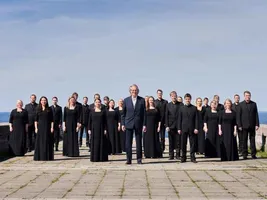
ARVO PART 90
ARVO PART 90
Košice Music Spring 29.05.2025 Cathedral of St. Elizabeth of Hungary, Košice 20:00
Estonian Philharmonic Chamber Choir
Tõnu KALJUSTE , chief conductor
Kadri TOOMOJA , organ
Programme:
Arvo Pärt (1935):
Berliner Messe: Kyrie, Gloria
Summa
Berliner Messe: Veni sancte spiritus
Nunc dimittis
Berliner Messe: Sanctus
After the victory
Berliner Messe: Agnus Dei
Which Was the Son of …
Come, creator.
From Kanon Pokajanen: Kontakion, Ikos
Kanon Pokajanen: Prayer After the Canon
Concert duration: approx. 70 minutes (without intermission)
Estonian composer Arvo Pärt wrote his Berliner Messe for the 90th German Catholic Days in Berlin in May 1990, the first to be held after the fall of the Berlin Wall. The work was originally composed for soloists and organ, and a second version for mixed choir or soloists with string orchestra was premiered in December 1991. In addition to the usual parts of the mass ( Kyrie , Gloria , Credo , Sanctu s, Agnus Dei ), additional parts are added for specific feast days. The musical structure is governed by the patterns of Pärt's "tintinnabuli" technique, which deals with chord triads in a distinctive way. The Summa is one of the works that Pärt composed in several versions. The work was originally composed in 1977 for voices a cappella. Due to the atheistic cultural policy of the Soviet regime, the title of the work conceals a coded message; in fact, the Summa is based on the text of the Latin Credo . The apparent simplicity of the work masks its extraordinary complexity, while the circular structure of the voices expresses symbolic meaning. Kanon pokajanen , composed in 1997 to the text of the Canon of Repentance , is Arvo Pärt's most extensive choral work. The canon used in the Orthodox Church consists of nine odes based on biblical themes. Pärt's music here introduces strong musical contrasts. The work premiered in 1998 at a concert marking the 750th anniversary of the Cologne Cathedral. It was performed by the Estonian Philharmonic Chamber Choir, conducted by Tõnu Kaljuste, to whom the work was dedicated. The prayer in Kanon pokajanen connects the performers with the listeners and creates in them a need for light and purity of soul.
